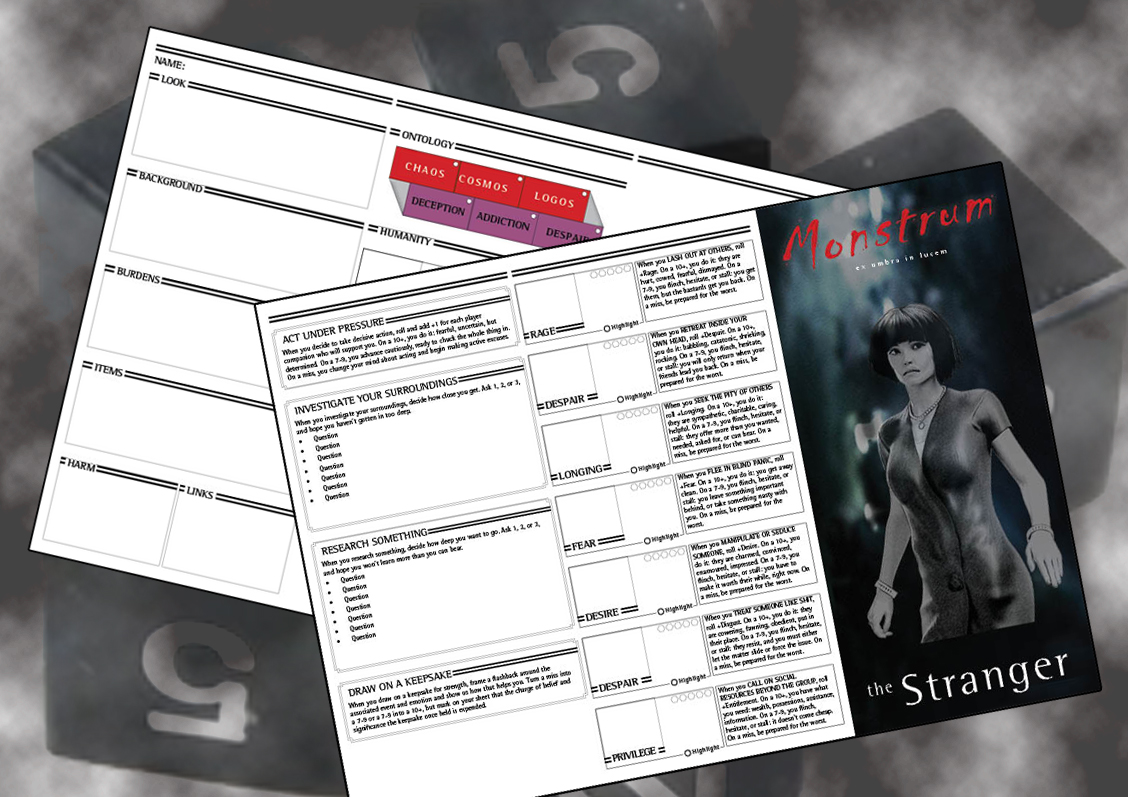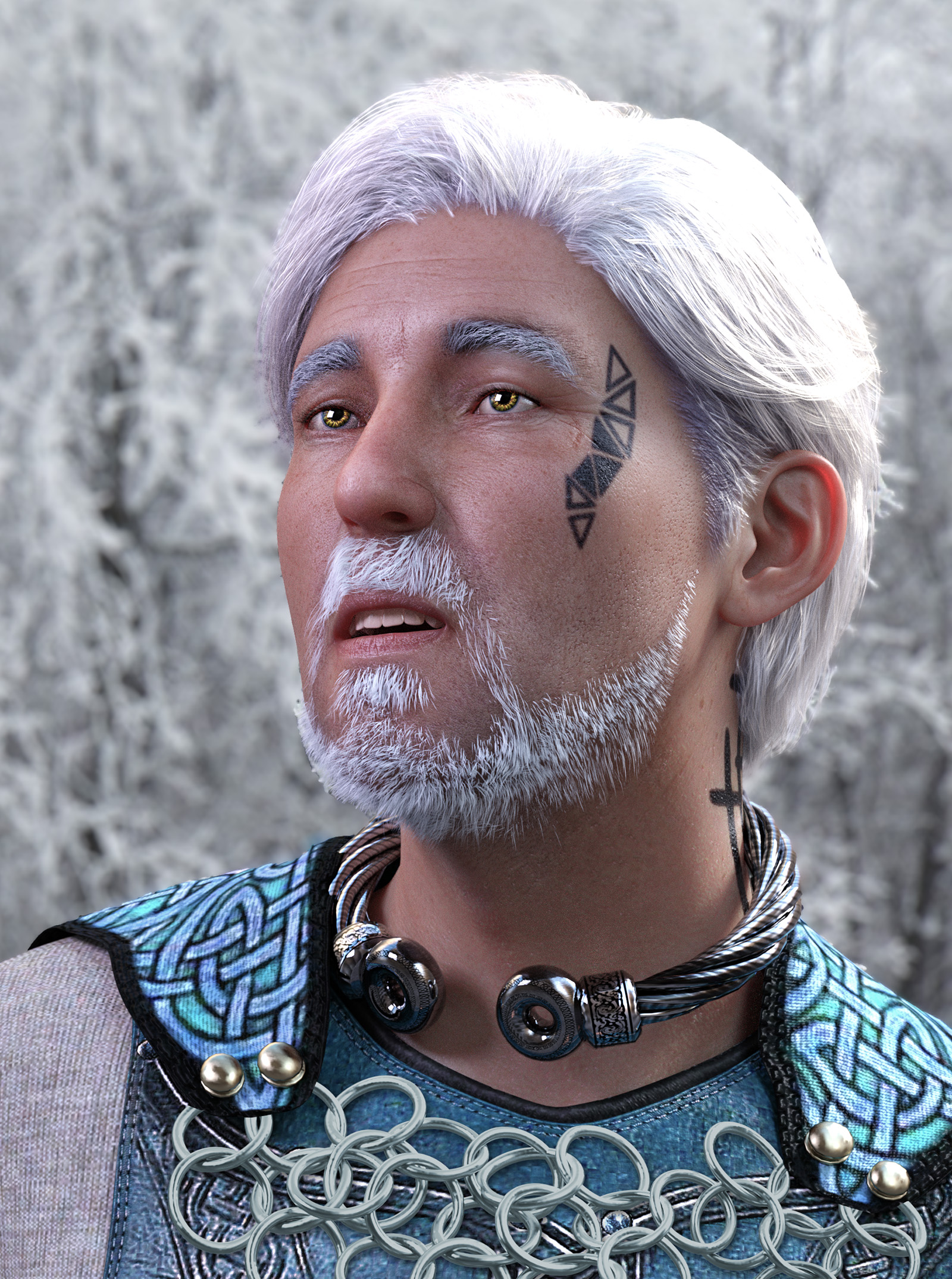
Luke Jordan, Pip Hughes and I are currently writing an Apocalypse World-derived horror game we’re calling Monstrum – ex umbra in lucem. It stems from our work on Turn of Midnight Waters (TOMW), and shares the basic motivation of formalising elements of the Australian Systemless tradition in a more structured way.
So here are some scattered initial thoughts, a summary of the process leading up to our working out the rules and stats – basically deciding what rpg horror is and how it works. It might sound at times like a half-baked manifesto, but it has proved really useful in helping us design the game.
It began with a quote from the Trauma section of ToMW:
We create ourselves. We create our stories, our meanings, our beliefs. Sometimes, we even do this consciously.
In our personal stories, we paint our actions and motivations as black and white, good or evil. In reality though, our thoughts and lives are etched a thousand shades of grey.
We are creatures of contradiction, of self-deception.
We live in fear. Fear of others, fear of being seen the fool, fear of sex, fear of ageing, fear of death. And anger, another kind of fear: the endless inchoate anger at the expectations of men, the defiance of women. Fear brings paralysis. Fear brings self-deceit.
And life, life… is very hard. Survival is very hard. You have killed off large parts of yourself, numbed and drugged and drank and denied those aspects of body and soul that cause shame and pain and anguish and agony.
What is left? You have your stories.
You have abandoned hope. You have suppressed your dreams.
You still have your stories.
What would be left if your stories died?
Monstrum
Monstrum is our attempt to create a game of psychological, existential and cosmic horror. It is a game about making the invisible visible, in culture, in sense and cognition, and in play.
Monstrum draws on Lovecraft, Machen, Blackwood, the pulps and the post-Lovecraft weird tale. And being as much Machen as Lovecraft, it offers the hopes that beyond the veil lie numinous realms of ecstasy as well as those of horror, if only we are strong enough to endure the gaze of the great god Pan.
Awe and terror and terrible, terrible beauty.
Monstrum seeks to explore the nature of reality, of cognition, of humanity. It is a psychological game that questions our notions of reality in the face of eruptions from outside. It is a game of moods and atmospheres, focusing on emotion, doubt, and the beating of black wings. It seeks to explore the anxiety and fundamental uncertainty at the heart of collective humanity.
Our aim is that Monstrum in play will centre on the enjoyable fear of anticipation and being scared, the thermometrics of ice between your shoulders, and the insight that’s with you long after the scene.
Monstrum is a game about emotions, and how we deal with them, about defining, defending and nurturing our humanity. Player moves derive from negative emotions: Desire, Despair, Disgust, Privilege, Fear Longing or Rage. These emotions will usually be acted out. They might be repressed, with consequences, And ultimately, they might be subject to a moment of catharsis, ultimately accepted, made conscious, owned for what they are, allowing the player character to act with full agency.
And against this, the player must nurture and grow their core Humanity.
By horror, I mean safe horror, game horror.
Not trauma, not shock.
Not gross-out or railroading.
An invitation to enter darkness that may be accepted or declined.
Play.
Trust.
Groupwork.
Game foundations
Horror is bigger than genre. In discussing what we wanted for Monstrum, we came up with the following guides.
You can’t scare a character. Work in trust and cooperation to scare the player.
Horror is fixated on knowing and feeling, the terror of knowing and the fear of feeling.
Horror is affect. Horror is emotion.
You are an ordinary person.
Perhaps you are a victim, a battler, an outsider.
You are haunted. By guilt. By desire. By the past.
You have burdens.
You have secrets.
You have scars.
You have a monster within.
We live in communities.
We love in families.
We struggle in groups.
We suffer in isolation.
We die alone.
Emotion is real.
Everything else is doubt.
There is no inside except as a folding of the outside.
Finding things is easy.
Doing things is difficult.
It is very difficult to fight alone.
Strength comes from the group.
Yet group relationships are ever fluid and volatile.
These assumptions derive from a particular theory of what horror is and how it might work.
We focus not on the monster, but the victim.
Not that Monstrum is without monsters.
There are monsters everywhere.
The universe pulses with ontological anomalies, the irreal, the rhythms, pulsions and patternings of non-human forces, with the unknowable.
Many of them have teeth. Or something worse than teeth.
Don’t peek.
Best not to look.
For the Player:
- Horror is powerlessness.
- Horror is lack of agency.
- Horror is uncertainty.
- Horror is fear of knowing too much while being crippled by uncertainty.
- Horror is vulnerability.
- Horror is anticipation of encountering something terrible. Come up to the lab and see what’s on the slab. ANTICI-P-P-P-PATION.
- Horror is a constant sense of dislocation.
- Horror is something we feel with our bodies and our minds.
- Cognitively, horror is about liminality, things that are neither one thing or another, twixt and between, categorically impure: neither human nor animal, seen more unseen, living nor dead. Liminality messes with the way we think. It makes us feel uncomfortable.
And horror is a series of storytelling and roleplaying techniques.
Horror is not allowing a player the security of their normal patterns of thought and belief. Therefore, Monstrum takes away lots of the usual roleplaying crutches.
There is no certainty. No lists of monsters and their hit points. No Mythos stats.
There is no general Defence move. No Attack Monster Move. No gun fetishism.
Monster hurts are GM fiat. They are usually bad. Really bad. Best stay at home.
If you don’t have a move, you surrender to the GM. Are you sure you want to be here?
Systemless affinities
Systemless gaming has always been very strong on horror. The first systemless showcase was an annual horror triptych called ‘Short Sharp Shocks’ (initiated at Necronomicon in 1989: the precursor to Pheno’s more widely focussed Triptych).
Monstrum seeks to mine the tradition of Systemless techniques and gaming philosophies.
Systemless recognises the importance of bodywork and affect in building mood and atmosphere.
Systemless recognises that the interface between player and character can be diffuse. Emotions can be shared.
Systemless sacrifices elaborate plotting for a focus on atmosphere and character interaction. The story itself is often about realisation and catharsis.
Systemless presents an interior story and an exterior story that are linked and are of equal importance. It uses a series of techniques to bring interior stories into shared gamespace, such as asking questions about motivations and feelings, and the ‘voice of conscience’ argument technique between player and keeper.
If it’s not in gamespace it’s not real.
What are you feeling?
What are you thinking?
Why is X acting this way?
What is X feeling?
Story itself is the system.
Emotion is the experience.
Insight is the goal.
Systemless began as a convention-centred style of gaming, based around a single, intense three hour game. This parallels Poe’s insight that successful horror must evoke a unity of effect – a single session’s play. Mood and atmosphere are dispersed at end of session. Campaigns must sacrifice this to a certain extent in favour of a slow burn, but the insight of bringing each session to a dramatic resolution is a useful one in all horror gaming.
The Keeper
In Monstrum, the Keeper is not the usual AW reliable source of truth. This is something that is nuanced, but needs to be clearly in mind.
As in Systemless gaming, the Keeper can act as an inner voice and the representative of basic drives. Within the bounds of the group’s Roleplaying Contract, she will mess with your head, plant doubt, question motives. She can be suggestive, but never directive. She is the angel or demon at your shoulder, the voice of conscience, the voice of temptation, giving form to inner turmoil. The player character has a moral perspective, and can assess situations according to their own model of the world. They can, and should, argue back to the Keeper, to bring inner states into gamespace. Their worldview is unstable; it will be challenged by events and realisations.
One of the Keeper’s goals in Monstrum is to cast doubt on players certainties, their treasured truths. The Keeper helps to expose the lies we tell ourselves about ‘reality’. To promote a sense of destabilisation while remaining true to the group contract. To promote cognitive estrangement and unworlding.
The game world is a world of uncertainty.
Always.
The universe is ambiguous.
The universe is unknowable.
The universe lies to you all the time.
Ex umbra in lucem.
Development of the game continues.





